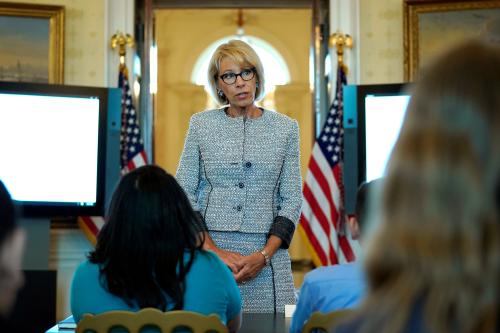To date, former President Donald Trump and Vice President Kamala Harris have only shared, well, “concepts of a plan” to improve K-12 schools. During this month’s presidential debate, American families, students, and teachers had no opportunities to learn about the candidates’ education positions. Moderators did not ask a single question about education. Of similar concern, we have heard little from either candidate about specific policies to support teachers in our nation’s schools. This is particularly troubling given the convincing body of research that teachers are one of the most important school-factors to improving student learning.
Trump’s agenda, outlined on his campaign’s website, is aimed at ensuring our children have “great teachers” by adopting merit pay and ending teacher tenure. Harris’s plan seems to focus on bolstering teachers unions, such as by ending “union busting.” Delegates at the Democratic National Convention adopted an education platform, endorsed by the vice president, that includes language about improving school working conditions to “make teaching sustainable.” Neither candidate has spoken in any substantive way about recruiting, preparing, and recognizing great teachers.
In the closing weeks of the election, if both candidates are serious about strengthening the teacher workforce, specific policies, not platitudes, will be critical to strengthening the nation’s teacher workforce. Of course, a U.S. president can’t singlehandedly fix our teacher workforce problems, but they can help to set a national agenda–while initiating some federal action along the way. Here’s what each candidate should consider as they detail their teacher policy proposals:
First, the two leading candidates should outline a vision for recruiting a high-quality, diverse teacher workforce. Supporting teacher pay should be central here: A recent survey found that low teacher pay prevented otherwise interested college students from considering a career in teaching. Both Harris and Trump should support the idea of a national minimum salary of $60,000 for K–12 public school teachers. Moreover, recognizing that housing is one of the largest expenses for educators, rural and urban local school districts across the country have started to build housing for teachers. These local efforts should inform presidential candidates’ policy priorities by creating an inter-departmental effort between the Department of Housing and Urban Development and Department of Education to develop housing in communities where we need teachers, one of our nation’s indispensable resources.
Second, great teachers—like great doctors—are not born that way, but developed. There is substantial variation in how the approximately 1,700 colleges and universities, school districts, for-profit and nonprofit organizations prepare future teachers. Recently, the Texas Education Agency placed the state’s largest preparation program, a for-profit online program, on probation for failing to adequately prepare beginning teachers. Across Texas and the nation, for-profit alternative certification enrollment has increased, while enrollment in traditional teacher preparation programs has declined. One ongoing critique of traditional university-based preparation is its emphasis on teaching theories of supporting student learning with less of an understanding about how to apply those theories into practice. Low-quality teacher preparation will not provide our children with the skills to enter the middle class. A recent report published by the National Academy of Education highlights the characteristics of a high-quality teacher preparation program, which include partnerships between preparation programs and school districts and placing teacher education candidates in classrooms of experienced and effective teachers. Such high-quality preparation can be obtained through traditional and alternative preparation programs, but we need federal leadership to establish and enforce these kinds of standards for programs across the country.
Third, like doctors, teachers who have mastered their craft should be able to demonstrate it and be rewarded for it. So, the leading presidential candidates should also have a vision for promoting and supporting great teachers. Such a plan must include a federal grants program that incentivizes states to support teachers to pursue National Board Certification, the gold standard of teacher certification. Similar to doctors, teachers must meet certification requirements to teach in a particular state. And, doctors, like teachers, through a series of rigorous exams, can earn a national board certification to demonstrate their professional expertise. Prior evidence shows that National Board Certified Teachers improve student outcomes when compared to teachers who are not board certified. But here’s the snag: while 80% of doctors in our country are board certified, only 4% of teachers are board certified. We need to encourage more teachers to earn this distinction and then reward them for their mastery, especially when teaching in hard-to-staff areas. States such as Texas, California, and Maryland have created incentive programs for educators to pursue National Board Certification. For teachers working in the highest-need schools, the annual stipends after earning board certification in Texas, California, and Maryland are $9,000, $5,000, and $17,000, respectively. Across red and blue states alike, policymakers have viewed investments in National Board Certification not only as a way to reward great teachers but also as a policy lever to retain teachers in schools where they are needed most. Presidential leadership on this issue will enhance teachers’ status and paychecks while improving access to quality teaching for disadvantaged students.
There are less than 40 days until the U.S. presidential election. Both candidates’ goals to “Make America Great” or to create an “Opportunity Economy” can be actualized by detailing teacher policy proposals to improve K-12 education. It is high time for more specific policies and fewer platitudes from both former President Trump and Vice President Harris.
Travis J. Bristol, Ph.D., is an associate professor of teacher education and education policy at U.C. Berkeley’s School of Education. He is also the board chair of the National Board for Professional Teaching Standards.







Commentary
When will the US presidential candidates talk about teachers?
American families, students, and teachers are waiting.
September 30, 2024